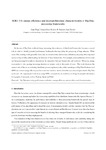BDEv 3.0: energy efficiency and microarchitectural characterization of Big Data processing frameworks

Use este enlace para citar
http://hdl.handle.net/2183/21721
A non ser que se indique outra cousa, a licenza do ítem descríbese como Atribución-NoComercial-SinDerivadas 3.0 España
Coleccións
- GI-GAC - Artigos [192]
Metadatos
Mostrar o rexistro completo do ítemTítulo
BDEv 3.0: energy efficiency and microarchitectural characterization of Big Data processing frameworksData
2018-09Cita bibliográfica
Jorge Veiga, Jonatan Enes, Roberto R. Expósito, Juan Touriño, BDEv 3.0: Energy efficiency and microarchitectural characterization of Big Data processing frameworks, Future Generation Computer Systems, Volume 86, 2018, Pages 565-581, ISSN 0167-739X, https://doi.org/10.1016/j.future.2018.04.030.
Resumo
[Abstract] As the size of Big Data workloads keeps increasing, the evaluation of distributed frameworks becomes a crucial task in order to identify potential performance bottlenecks that may delay the processing of large datasets. While most of the existing works generally focus only on execution time and resource utilization, analyzing other important metrics is key to fully understanding the behavior of these frameworks. For example, microarchitecture-level events can bring meaningful insights to characterize the interaction between frameworks and hardware. Moreover, energy consumption is also gaining increasing attention as systems scale to thousands of cores. This work discusses the current state of the art in evaluating distributed processing frameworks, while extending our Big Data Evaluator tool (BDEv) to extract energy efficiency and microarchitecture-level metrics from the execution of representative Big Data workloads. An experimental evaluation using BDEv demonstrates its usefulness to bring meaningful information from popular frameworks such as Hadoop, Spark and Flink.
Palabras chave
Big Data processing
Performance evaluation
Energy efficiency
Microarchitectural characterization
Performance evaluation
Energy efficiency
Microarchitectural characterization
Descrición
This is a post-peer-review, pre-copyedit version of an article published in Future Generation Computer Systems. The final authenticated version is available online at: https://doi.org/10.1016/j.future.2018.04.030
Versión do editor
Dereitos
Atribución-NoComercial-SinDerivadas 3.0 España
ISSN
0167-739X
1872-7115
1872-7115






